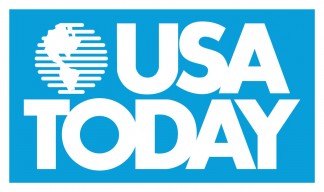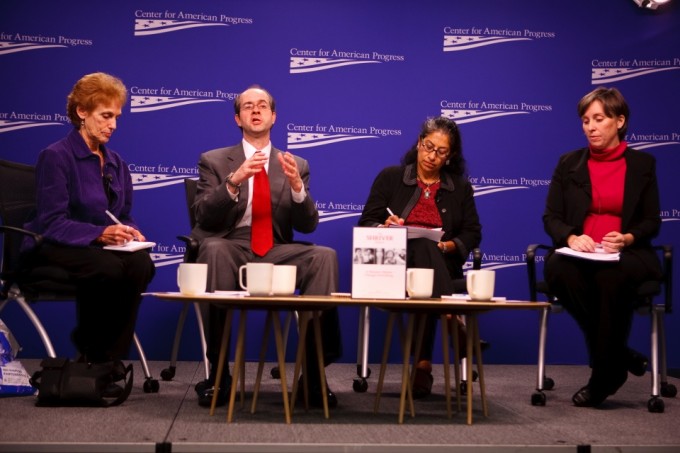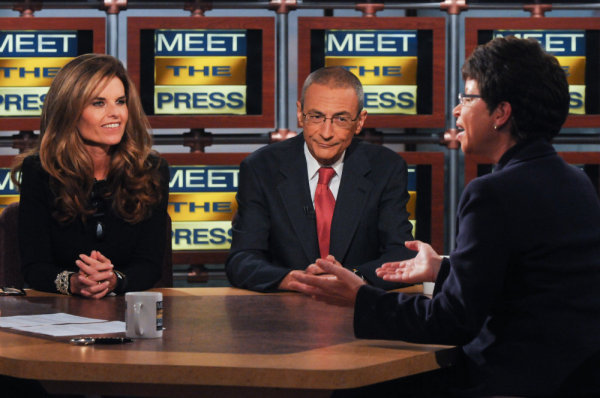
Released October 2009
For the first time in our history, half of all U.S. workers are women. Mothers are the primary breadwinners or co-breadwinners in nearly two-thirds of American families.
And that changes everything.
Not just for women but also for men. For families. For bosses. For co-workers. For our society.
The battle of the sexes is over. Men and woman overwhelmingly agree on what they want in life, and how they view their roles in marriage, as parents, and in their jobs.
This is a permanent change in our culture. The trend line of women workers rises in the future because the jobs women are most likely to hold are expected to increase compared to men’s.
There’s far more occurring here than simply a change in workplace demographics. This is a social transformation affecting nearly every aspect of our lives – how we work, how we play and how we care for one another.
For more than one year, Maria Shriver and the Center for American Progress explored this transformation of the way Americans live and work. A transformation difficult to imagine a generation ago when Shriver’s uncle, President John F. Kennedy, created the first Commission on the Status of Women in 1961 and named Eleanor Roosevelt as its chair.
Roosevelt would be pleased – and proud — to know that the footprint of today’s American worker is as likely to be a heel as a boot. And she would likely enthusiastically embrace the effect that sea change has had on America.
Included here is research by leading authorities on working families and the United States labor market, government, business, media and faith. The findings combine the work of academics, economists and pollsters with a collection of diverse essays from famous and less well-known Americans as well as on-the-ground reporting from around the country.
Among the findings, is what often happens in the face of sweeping change: Some of our institutions lag behind and don’t yet reflect this new dynamic. Government, business, the media and our faith communities, in many cases, still cling to outdated models of who works and who cares for our families.
For example, men now agree with women that government and business need to provide flexible work schedules, better childcare, family and medical leave and equal pay.
And over 80 percent of men and women agree businesses that fail to adapt to the needs of modern families risk losing good workers.
Only by examining this fundamental shift in how Americans live and do business — and acknowledging the profound changes it has wrought — can we grow and flourish.
Let the conversation begin.
By Oprah Winfrey
We women have been having conversations since the birth of this nation. We know when it’s time for a conversation to begin. Expressing ourselves as women, expressing ourselves as people of success and power and influence, it reminds me of a convention held in Akron, Ohio in 1852, where Sojourner Truth, a former slave whom I consider one of my great mentors, gathered together suffragettes asking, pleading, and fighting for the right to vote. Sojourner Truth, a proud, six-foot-tall Amazon-like figure, walked up to the podium and said:
Well, children, where there is so much racket, there must be something out of kilter. I think that ’twixt the negroes of the South and the women at the North, all talking about rights, the white men will be in a fix pretty soon. But what’s all this here talking about? If the first woman God ever made was strong enough to turn the world upside down all alone, these women together ought to be able to turn it back, and get it right-side up again!
Those are the words of Sojourner Truth, who believed that without media, without mass marketing, without any social programs, women joined together had the possibility of turning the world right-side up.
Now, in 2009, there’s so much racket again. Today, it’s about women becoming half of all the American workers, about making more money than men, about what men think about this, and about what our families, our government, and our politicians, bosses, clergy, and aging parents are going to do. Men and women, families of all kinds, are negotiating about household responsibilities, child care, work, and sex. There’s a lot of noise going on in this country and in this report about what it means to live in a woman’s nation.
It seems to me it’s an important conversation to have. Are our political, government, faith, and media leaders out of touch with the realities of how most families live and work today, just like they were out of touch in the day of Soujourner Truth? Some might say our nation has now been turned right-side up, but no one seems to recognize this outside of the families living and working every day. There is something a-kilter.
We have earned the right to celebrate the kind of power that isn’t
about landing the corner office, but about stoking an internal fire.
Where do we go from here? One thing is for sure: Women have a new kind of power in the workplace, in the marketplace, in the boardroom, and in the bedroom. Women have as many definitions of power as there are women to use it.
Forget the idea that being powerful is about how rich or important you are, or whether or not you get your own coffee in the morning. What I find powerful is a person with grace, with courage, with the confidence to be her own self and to make things happen. We have earned the right to celebrate the kind of power that isn’t about landing the corner office, but about stoking an internal fire.
For me, there is no real power without spiritual power. A power that comes from the core of who you are and reflects all that you were meant to be. A power that’s connected to the source of things. When you see this kind of power shining through someone in all its truth and certainty, it’s irresistible, inspiring, elevating. I can feel it in myself sometimes, mostly when I’m sharing an insight that I know will have an impact on someone’s life and I can see that they “get it.” I get real joy from helping other people experience those “aha” moments. That is where my power lies.
“When we align our thoughts, emotions, and actions with the highest part of ourselves, we are filled with enthusiasm, purpose, and meaning,” writes Gary Zukav in his best-selling book The Seat of the Soul. “When the personality comes fully to serve the energy of its soul, that is authentic empowerment.”
Fulfilling your purpose with meaning is what gives you that electrifying “juice” and makes people stand in wonder at how you do it. The secret is alignment: when you know for sure that you’re on course and doing exactly what you’re supposed to be doing, fulfilling your soul’s intention, your heart’s desire, or whatever you choose to call it (they’re all the same thing). When your life is on course with its purpose, you are your most powerful. And you may stumble, but you will not fall.
I know for sure that in every challenging experience there’s an opportunity to grow, enhance your life, or learn something invaluable about yourself. Every challenge can make you stronger if you allow it. Strength multiplied equals power.
We have the power as women, as families, as a nation to rise to the challenges of our time. To hear each other out. To talk it out. To let the conversation begin. Together, we ought to be able to “turn it back, and get it right-side up again!”
NBC News: Obama: Men Still ‘Obtuse’ about Women’s Role

The Report’s comprehensive and significant material prompted a special weeklong series of broadcasts across NBC News platforms in October 2009. “Meet the Press – A Woman’s Nation,” dedicated specifically to the report and its findings, was awarded a 2010 Gracie Award for “Outstanding Interview Program or Feature.”
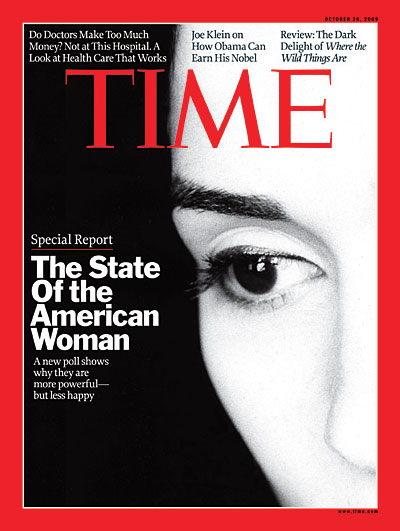
TIME magazine committed its October 15, 2009, cover issue to the status of the American woman, drawing heavily on the report’s groundbreaking national poll and subject matter.
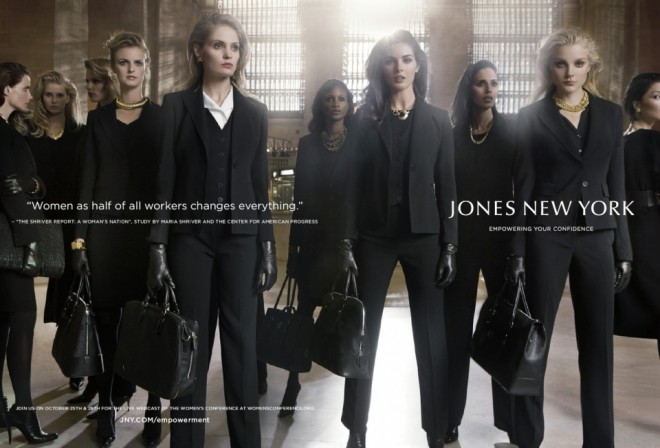
Featured in a national Jones New York advertising campaign in Fall, 2010.

Inspired a special bipartisan U.S. House of Representatives Education and Labor Committee hearing to discuss The Shriver Report’s findings and federal implications.

Incorporated into the syllabus of Women’s Studies courses at colleges and universities across the country.
Maria Shriver
“The Shriver Report presents an accurate and detailed portrait of American women and families at this transformational moment in our history,” Maria Shriver said, “It’s been almost fifty years since my uncle, President John F. Kennedy, asked Eleanor Roosevelt to do the same by chairing the very first Commission on the Status of the American Woman. We’ve come a long way since then. Now I’m hoping policymakers, armed with our surveys and analysis, can develop updated policies and practices that address and support the needs of today’s American women, men, and families.”
Daniel Goleman
Author of Emotional Intelligence
“The Shriver Report offers groundbreaking insights into one of the most important social trends of our time.”
Laurence H. Tribe
Carl M. Loeb University Professor, Harvard Law School
“The Shriver Report: A Woman’s Nation Changes Everything” is a vitally important publication, one that will reshape the nation’s and world’s conversation about the role of women.”
Maria Shriver and John D. Podesta would like to thank The Rockefeller Foundation, Hewlett-Packard Company, Cisco Systems, Inc., Visa, Pacific Gas & Electric Company, Marcy Carsey and all of our financial partners for their generous support of this groundbreaking report. Without their belief in us, the report would not have been possible.
From Maria Shriver
This book is filled with facts, and here’s one more: This report wouldn’t even exist without Karen Skelton. She pushed this project from the very beginning. She spearheaded it, massaged it, shepherded it—in short, she made it happen. We’ve been working together for six years, and while Karen may labor behind the scenes, there’s nothing behind-the-scenes about her. She’s a brilliant political strategist, writer, attorney, talent scout, and leader of women and men—and a spectacular mother and friend. She juggles policy, political clients, polls, and prose, and still finds time for yoga and church. She makes normal multitaskers look like they’re standing still.
Leslie Miller—who also jumped in before we had a plan or partners—is a veteran communications strategist with enormous talents that enabled us to expand the reach of the project. Leslie is the calm in the storm. She takes the whirlwind of moving pieces, people and targets and creates order and direction.
One of this project’s greatest assets is the extraordinary John Podesta. I am honored to partner with him and to call him my friend. This endeavor wouldn’t have been possible had the Center for American Progress—led by John—not been open to this collaboration.
Laura Nichols, our CAP ally from the beginning, is a rare jewel—sparkling, brilliant, strong, fierce, loyal. She led a team at CAP that exceeded all expectations and standards of professionalism. Without her we would not have been able to seamlessly blend academic expertise with cultural and current trends. She saw no challenges without solutions, seized opportunities, sought consensus, and became the Super Glue to a phenomenal cross-country marriage.
This report is groundbreaking in large part due to the work of CAP’s Heather Boushey and Ann O’Leary. They and their colleagues have all worked incredibly hard around-the-clock to make this project work. And Ed Paisley’s patient and seasoned editing, along with Shannon Ryan’s savvy and stylish layout, made this report stand out like no other report of its kind.
Becky Beland assisted in every aspect of execution with the kind of discipline, commitment, and perseverance that gives you confidence in the next generation of up-and-coming women. Senior Advisor Olivia Morgan managed, befriended, learned from, and nurtured our impressive senior advisory council.
This team led a group of highly accomplished, passionate people who all believed in this project from the get-go and birthed it. I am grateful for Yasmine Abboud, Coby Atlas, Lyndie Benson, the team at the Dewey Square Group, Tina Frank, Alexandra Gleysteen, Debby Goldberg, Adam Greenfield, Noel Greenwood, Shannon Marven, Nancy McFadden, Jan Miller, Terri New, Barbara O’Connor, Susan Pinkus, Matt Rallens, Amy Rosenberg, Kristina Schake, and Erin Stein. From the University of Southern California Annenberg Center on Communication Leadership and Policy, I am grateful to Geoff Cowan, Geoff Baum, Cinny Kennard, Stacy Smith, Alison Trope, and Rebecca Shapiro.
We thank our partner, the Berkeley Center on Health, Economic & Family Security at UC Berkeley School of Law, led by Ann O’Leary, for the academic rigor and resources they brought to the project.
We thank Debbie Fine, CAP’s general counsel, and our team of Lawrence Shire and Peter Grant from Grubman, Indursky & Shire, PC, and Munger, Tolles & Olson LLP’s Steve Guise, for welcomed and wise legal judgments.
Much appreciation goes to all the roundtable participants who shared their personal stories with me and the people who worked to make the roundtables and other meetings around the country happen. I would especially like to thank Sukhinder Singh Cassidy and Accel Partners, Aileen Lee from Kleiner Perkins Caufield & Byers, Sue Bostrom and Cisco, Howard Schultz and the Starbucks Headquarters in Seattle, The Henry Ford in Dearborn, Michigan, Governor Jennifer Granholm and First Gentleman Dan Mulhern, Atlanta Mayor Shirley Franklin, North Avenue Presbyterian Church in Atlanta, Helen Torres, Daniel Zingale, and The California Endowment.
Thanks to everyone who wrote a personal essay for this project, whose diverse voices let us better understand how living in a woman’s nation changes everything.
All of us stand on someone else’s shoulders. I am well aware I wouldn’t be writing this without the courageous women who’ve gone before me—women who fought for Title VII, Title IX, for choice, and those women who paved the way for me to be a journalist. I also thank my mentor, who knows who she is. I tell my daughters, “Because someone else fought for you, you have the luxury of just opening the door and walking through. Be grateful, work hard yourself, and pass it on.”
Among those upon whose shoulders we stood on for this report are the amazingly diverse men and women who agreed to advise us along the way, our A Woman’s Nation Advisory Committee:
Madeleine K. Albright
Anna Burger
Majora Carter
Sister Joan Chittister
John Chambers
Katherine Chon
Eve Ensler
Marty Evans
Bill Frist
Judy Gold
Daniel Goleman
Christie Hefner
Antonia Hernández
Yvonne Hunt
Patricia Kempthorne
Billie Jean King
Wendy Kopp
Judy Lichtman
Monica Lozano
Todd McCracken
John Miller
Pat Mitchell
Janet Murguía
Christiane Northrup
Suze Orman
Condoleezza Rice
Cheryl Saban
Ruth Simmons
Sukhinder Singh Cassidy
Mena Trott
Andrea Wong
Finally, we extend an enormous thank you to our media partners, without whom we would not be heard: NBC News, Telemundo, and Time magazine.
From Editors Heather Boushey and Ann O’Leary
at the Center for American Progress
We would like to thank Maria Shriver and John Podesta for their leadership on this project. Without their collaboration, none of this would have happened. Maria’s team, Karen Skelton and Leslie Miller, showed a dedication to making this report sing and getting every last piece right. We are grateful to them. Laura Nichols at CAP led our team on this effort and we are so grateful for her tireless effort to manage this project on a tight timeline and keep us all on track. This report could not have happened without the dedication and talent of Ed Paisley, who spent countless hours and weekends working with us, wowing us constantly with his skill, dexterity, and patience throughout. And we are incredibly appreciative of Shannon Ryan’s willingness to go above and beyond the call of duty and for her beautiful layout of the Report.
Tremendous thanks go to the Economic Policy team at the Center for American Progress and the Berkeley Center on Health, Economic & Family Security at UC Berkeley School of Law for providing research support and lending their resources and staff to getting this report finished in time. In particular, we couldn’t have done this without the leadership and good humor of Michael Ettlinger, vice president of CAP’s economic policy team.
A big shout out to the fabulous women at the Center for American Progress for all their help and support—Jessica Arons, Becky Salay, Ilia Rodriguez, Debbie Fine, Allison Lessne, Anna Soellner, Sarah Rosen Wartell, and all the rest.
As editors, we are especially grateful for such terrific authors. They worked with us throughout accelerated timelines and detailed editing process. We are so glad that each and every one of you has contributed to this process and it has been a privilege to work with you throughout.
Lauren Smith has been the day-to-day backbone of this project and we are grateful for her humor, her dedication, her skills, and especially her tireless effort to make sure that every sentence of this report said what it meant to say. To make sure every fact and footnote was just right, we couldn’t have done this without our fantastic team of research assistants—Justin Masterman, Eleanor Blume, Zoe Savitsky, Tracy Petznick—and CAP’s dedicated economic policy interns, Maddie Esposito, Jillian Moreno, Regina Topolinskaya, and Ilana Fischer. And special thanks to K.C. Summers, a former (and long-time) editor at The Washington Post who is now a freelance writer and editor in Washington, for her deft and concise copy editing work.
We have imposed on countless colleagues to help us with this work and we are grateful for their time and expertise. We thank Judy Lichtman and Karen Minatelli from the National Partnership for Women and Families, and Marcia Greenberger and Duffy Campbell from the National Women’s Law Center for giving us invaluable advice at the start of this project. We extend sincere gratitude to Lee Badgett, Ellen Bravo, Stephanie Coontz, Katie Corrigan, Liana Fox, Angie Kelley, Aarti Kohli, Alan Rosenblatt, Malika Saada Saar, Liz Weiss, and Joan Williams, who gave us guidance throughout the writing process on bringing the chapters together and helping us do our best to incorporate more voices and perspectives. We are grateful to John Schmitt, who put together the data used in many of the chapters and to Jeff Chapman for running the data on breadwinner mothers.
As is so often the case with large projects like this, we stand on the shoulders of giants. The community of scholars who work on these issues have provided us with the body of research underpinning the findings of this report and the advocates work tirelessly to create a world that values combining work and care. We are honored to be a part of this community and are grateful for their support in this project.
Finally, we are indebted to our families. Goodwin Liu and Todd Tucker have stood by our sides despite long hours and weekends and vacations full of editing. Both have provided invaluable input into the chapters and the project has been improved from their masculine perspectives. Goodwin has taken on even more than his normal share of 50-50 parenting during this project, encouraging me (Ann) with emailed photos of our 2-year old from the zoo or the playground as I worked away on weekend mornings.
From individual chapter authors
“The New Breadwinners,” by Heather Boushey
Thanks go first and foremost to Ann O’Leary for her superb editing and incisive commentary on my chapter, as well as being a model colleague and friend throughout this entire process. Lauren Smith has provided invaluable service for this chapter and I am thankful for all her help. Thanks to Michael Ettlinger and the rest of CAP’s economic policy team for their guidance, support, and assistance. I am grateful for Jeff Chapman’s time and expertise, as well as the work of John Schmitt. A number of wonderful colleagues provided comments on earlier drafts and I am grateful for their help: Randy Albelda, Lee Badgett, Ellen Bravo, Stephanie Coontz, Angie Kelley, and Liz Weiss. I cannot thank Ed Paisley and Shannon Ryan enough for their incredible work and attention to detail in editing my chapter and graphs. The biggest thanks goes to Todd Tucker for his edits, love, and support.
“Family Friendly for All Families,” by Ann O’Leary and Karen Kornbluh
The authors would like to thank Heather Boushey for her partnership and commitment to editing and providing guidance on our chapter, and her friendship and encouragement throughout this project. We would also like to thank Ellen Bravo, Judy Lichtman, and Goodwin Liu for their guidance and helpful comments. Ed Paisley made our chapter sing and we thank him tremendously. We thank Zoe Savitsky, Tracy Petznick, Eleanor Blume, Justin Masterman, and Lauren Smith for their tremendous research assistance. Finally, Ann would like to thank the faculty and staff at Berkeley CHEFS for their support and encouragement.
“Sick and Tired,” by Jessica Arons and Dorothy Roberts
The authors would like to thank Melissa Alpert, Eleanor Blume, Jonathan Hillel, Justin Masterman, Valerie Shen, and Lauren Smith for their research assistance; the Kirkland & Ellis Fund for research support; Claire Brindis, Karen Davenport, Shira Saperstein, and Judy Waxman for their helpful feedback; and Heather Boushey, Ann O’Leary, and Ed Paisley for their guidance and keen editing.
“Better Educating Our New Breadwinners,” by Mary Ann Mason
The author would like to thank Cynthia Brown, Delaine Eastin, Catherine Hill, Lisa Maatz, Jorge Ruiz de Velasco, and Louis Soares for their guidance and advice. The author would also like to thank the tremendous team of research assistants at Berkeley CHEFS, especially Tracy Petznick and Eleanor Blume, for their diligence and hard work on this chapter. Finally, the author thanks Ann O’Leary, Heather Boushey, and Ed Paisley for their hard work in shaping and guiding this chapter to the very end.
“Got Talent? It Isn’t Hard to Find,” by Brad Harrington and Jamie J. Ladge
The authors would like to thank Annie Soisson of Tufts University for the excellent review and thoughtful insights she provided on this chapter. We would also like to acknowledge the work of the Boston College Center for Work & Family, whose research and corporate engagement over the past 20 years has supported working individuals and their families and has provided a strong foundation for our work.
“The Challenge of Faith,” by Sally Steenland and Kimberly Morgan
The authors would like to thank Stephanie Boddie, Shaun Casey, Penny Edgell, and Susan Thistlethwaite for providing helpful comments on the chapter, and Mary Ellen Konieczny, Brian Steensland, and Bradford Wilcox for offering helpful ideas on our research. We’d like to thank Jonathan Duffy, Nan Futrell, and Zoe Savitsky for assisting with research. Thanks also to Lauren Smith for shepherding our chapter through many drafts and to Justin Masterman for finalizing late changes and organizing footnotes. And finally, thanks to Heather Boushey, Ann O’Leary, and Ed Paisley for their guidance, support, and good edits.
“Where Have You Gone, Roseanne Barr?” by Susan Douglas
This essay draws from my book Enlightened Sexism: The Seductive Message That Feminism’s Work Is Done, so I would like to thank my editor at Henry Holt, Paul Golob, for his invaluable assistance in honing my arguments. Thanks also to Heather Boushey, Ed Paisley, and Ann O’Leary for their comments and revisions.
“Has a Man’s World Become a Woman’s Nation?” by Michael Kimmel
The author would like to thank Scott Coltrane, both for his pioneering research and his help in sifting through it. I would also like to thank Amy Aronson, and Ann O’Leary and Heather Boushey, for exemplary editorial shepherding.
Advisory Network members are national thought leaders who contribute to all aspects of our Special Reports based on their years of unique experience and expertise, helping to make them award-winning, ground-breaking, and solutions-oriented examinations of the status of the American women at transformational moments in history. Each member’s community of influence helps amplify our discussion, expanding The Shriver Report network’s reach from coast-to-coast, from University classrooms to the halls of Congress, from the White House to community-based organizations, foundations, businesses, government leaders, and families. As a member of the Advisory Network, participants are asked to involve their affiliated organizations in our research and content development, offer substantive guidance on issues, messaging, and strategies, and to help identify specific solutions that can address the needs of women and families today.
Madeleine K. Albright
Former Secretary of State Chair of Albright Stonebridge Group
Anna Burger
Chair, Change to Win Secretary-Treasurer, Service Employees International Union
Majora Carter
Environmental justice advocate and economic consultant Founder, Sustainable South Bronx
Sister Joan Chittister
OSB & Author, The Gift of Years Co-chair of the Global Peace Initiative of Women
John Chambers
Chairman and CEO, Cisco, Inc.
Katherine Chon
President and Co-founder, Polaris Project
Eve Ensler
Playwright, feminist and anti-violence activist Writer and producer, The Vagina Monologues
Marty Evans
Navy Admiral (Ret.) Former CEO, American Red Cross Former CEO, Girl Scouts of the USA
Senator William H. Frist, M.D.
Former U.S. Senate Majority Leader Chairman, Hope Through Healing Hands
Judy Gold
Former Chair, Obama for America Women’s Policy Committee Former Chair, Illinois Commission on the Status of Women
Daniel Goleman, Ph.D.
Author of Emotional Intelligence and Social Intelligence: The New Science of Human Relationships
Christie Hefner
Former Chairman & CEO, Playboy Enterprises Co-Founder, The Committee of 200 board member, Springboard Enterprises
Antonia Hernández
President and CEO, CA Community Foundation
Yvonne Hunt
Director of Global Philanthropy, Hewlett-Packard Company
Patricia Kempthorne
Founder and President/CEO, Twiga Foundation, Inc.
Billie Jean King
Tennis champion Founder, Women’s Tennis Association, Women’s Sports Foundation, and World Team Tennis
Wendy Kopp
CEO and Founder, Teach For America
Judy Lichtman
Senior advisor and former President, National Partnership for Women and Families
Monica Lozano
Publisher and CEO, La Opiniín
Todd McCracken
President, Small Business Association
John Miller
Former US Ambassador at Large on Modern Day Slavery
Pat Mitchell
CEO, The Paley Center for Media
Janet Murguía
President and CEO, National Council of La Raza
Dr. Christiane Northrup
Pioneer in Women’s Health and Wellness OB/Gyn Author, Women’s Bodies, Women’s Wisdom, The Wisdom of Menopause, and Mother-Daughter Wisdom
Suze Orman
Internationally acclaimed personal finance expert; Host of The Suze Orman Show
Condoleezza Rice
Former Secretary of State
Cheryl Saban, Ph.D.
Author and Founder, The Women’s Self Worth Foundation
Ruth Simmons
President, Brown University
Sukhinder Singh Cassidy
CEO-in-residence, Accel Partners
Mena Trott
Co-founder and President, Six Apart
Andrea Wong
President and CEO, Lifetime Networks






